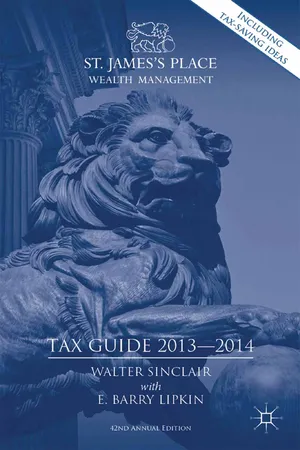
- English
- ePUB (mobile friendly)
- Available on iOS & Android
eBook - ePub
St. James's Place Tax Guide 2013-2014
About this book
The 42nd annual edition of the leading guide to taxation in Britain. This practical and user-friendly guide is a bestseller with students, professionals, accountants and private individuals, explaining in simple terms how the UK tax system works and how best to minimise tax liabilities.
Trusted by 375,005 students
Access to over 1 million titles for a fair monthly price.
Study more efficiently using our study tools.
Information
Chapter 1
THIS YEAR’S TAX CHANGES
1.1 Introduction
This chapter summarises many of the changes to the tax rules and rates which take effect for 2013–14. Also included are some important changes announced for future years. Tax planning pointers have been included in italics and these are amplified in Chapter 26. At the end of this chapter you will find a table of key rates and allowances for 2013–14.
You should remember that not all the changes included in the 2013 Budget take effect for 2013–14, which gives a planning interval in some cases.
1.2 Income tax
The rate bands have changed.
1.2.1 Income tax rates (5.0)




The additional rate (45 per cent) provides valuable scope for wealthy couples to save tax by equalising their income (26.2.11).


1.2.2 Allowances and reliefs
Allowances such as personal allowance and age allowance have been increased (3.3).





Elements of child tax credit (3.4.4) and Working Tax Credit (WTC) increase for 2012–13 (3.4.4).
1.3 Tax on employments



1.4 Business taxation






Table of contents
- Cover
- Title
- Copyright
- Contents
- Preface by Sir Mark Weinberg
- Abbreviations used in the Guide
- Introduction
- 1 This year’s tax changes
- 2 The basis of your tax liability
- 3 Personal reliefs
- 4 Annual interest and other payments
- 5 Computing your income tax bill
- 6 Husband, wife, civil partners and children
- 7 Income from land and property
- 8 Income from dividends and interest
- 9 Life assurance
- 10 Income from employments and PAYE
- 11 Income from businesses and professions
- 12 Partnerships
- 13 Companies
- 14 Pensions
- 15 Miscellaneous aspects
- 16 Returns, assessments and repayment claims
- 17 Domicile and residence
- 18 Tax on foreign income
- 19 Non-residents, visitors and immigrants
- 20 Capital gains tax
- 21 The taxation of trusts and estates
- 22 Inheritance tax
- 23 An outline of VAT
- 24 Stamp duty
- 25 Social security
- 26 Tax-saving hints
- 27 Tax tables
- Glossary
- Index
Frequently asked questions
Yes, you can cancel anytime from the Subscription tab in your account settings on the Perlego website. Your subscription will stay active until the end of your current billing period. Learn how to cancel your subscription
No, books cannot be downloaded as external files, such as PDFs, for use outside of Perlego. However, you can download books within the Perlego app for offline reading on mobile or tablet. Learn how to download books offline
Perlego offers two plans: Essential and Complete
- Essential is ideal for learners and professionals who enjoy exploring a wide range of subjects. Access the Essential Library with 800,000+ trusted titles and best-sellers across business, personal growth, and the humanities. Includes unlimited reading time and Standard Read Aloud voice.
- Complete: Perfect for advanced learners and researchers needing full, unrestricted access. Unlock 1.4M+ books across hundreds of subjects, including academic and specialized titles. The Complete Plan also includes advanced features like Premium Read Aloud and Research Assistant.
We are an online textbook subscription service, where you can get access to an entire online library for less than the price of a single book per month. With over 1 million books across 990+ topics, we’ve got you covered! Learn about our mission
Look out for the read-aloud symbol on your next book to see if you can listen to it. The read-aloud tool reads text aloud for you, highlighting the text as it is being read. You can pause it, speed it up and slow it down. Learn more about Read Aloud
Yes! You can use the Perlego app on both iOS and Android devices to read anytime, anywhere — even offline. Perfect for commutes or when you’re on the go.
Please note we cannot support devices running on iOS 13 and Android 7 or earlier. Learn more about using the app
Please note we cannot support devices running on iOS 13 and Android 7 or earlier. Learn more about using the app
Yes, you can access St. James's Place Tax Guide 2013-2014 by E. Lipkin, W. Sinclair, E. Lipkin,W. Sinclair in PDF and/or ePUB format, as well as other popular books in Business & Accounting. We have over one million books available in our catalogue for you to explore.